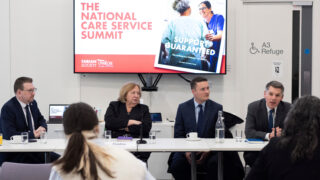Executive pay packages are soaring at private equity firms that own care homes, while conditions plummet for residents and staff, says a report published by UNISON today (Wednesday).
Directors of for-profit investment companies across the UK are now collecting 13 times the wages of the care workers they employ, according to new data from the University of Surrey and analysts Trinava Consulting.
The 43-page report – Held to Ransom – reveals workers and the people they support, including the elderly and those with disabilities, are paying the price for profit being put before care.
In-depth interviews conducted by University of Surrey researchers with workers expose chronic and deliberate understaffing of homes, rationing of medical supplies and food, and the falsifying of paperwork to cover up mismanagement.
UNISON says the massive pay rises are the result of greed, not market competition, and called for urgent reform of the crisis-hit care sector. The union is warning even more staff could quit as they struggle to cope in the worst cost-of-living crisis in decades.
The average salary has rocketed by more than 100% in five years for top executives at some of the largest care home owners including Barchester, HC-One, Care UK, Avery Healthcare, and Signature Senior Living, says the research.
Remuneration packages for the highest-paid bosses at these firms have increased on average from £146,100 to £296,600 between 2015 and 2020. This compares with an increase from £15,400 to £22,200 for staff at the homes they run.
More than one in nine (12%) care beds in the UK are now in the hands of investment firms, including private equity, hedge funds, and real-estate investment trusts. Conservative MP Jeremy Hunt described their conduct as “the unacceptable face of capitalism” in an interview for BBC Panorama’s Crisis in Care: Follow the Money, which was screened in December 2021.
Overall, the report authors say their findings paint a picture of a care sector that is deeply unfair in terms of who benefits from its ‘financialisation … and who pays the price’.
Highlighting a sector stripped to the ‘bare bones’, employees said they feel left ‘in the dark’ about their future and that of their care home, and that employers do not care about their or residents’ welfare.
Their experiences show a systematic attempt by many employers to squeeze as much as possible out of each worker, for as little money as possible, say the report authors.
Chronic under-resourcing and understaffing were key issues. Tactics to cut staff costs included limiting or not offering overtime pay, not paying workers for breaks, and limiting holidays.
Residents sometimes go without appropriate care, timely medication or sufficient sanitary supplies, with many left feeling hungry or isolated. One senior care worker in a home for the elderly, said residents had to ’sit wetting themselves’ because of a lack of available staff.
Skimping due to tight budgets is affecting staffing levels, medical supplies, the quality and quantity of food for residents, and access to leisure activities. Staff felt this was detrimental to the quality of care and service they were able to provide to residents.
Some staff said they had to reach into their own pockets to bring in food or toiletries for residents to compensate for funding shortfalls.
Most care staff interviewed worked at homes owned by for-profit investment companies. Those at charity-owned care homes raised some similar issues but they felt these problems did not affect the quality of care delivered to residents.
UNISON is calling for reforms, including a move towards a non-profit care sector and a limit on the size of care home groups.
UNISON general secretary Christina McAnea said: “These findings are shocking and unacceptable. These firms are paid to provide efficient and quality care, but instead residents are being short-changed and staff mistreated.
“It’s costing families a lot to have their loved ones looked after. People will rightly expect that money to go on the best care. Not to fund huge profits and mega salaries for care home bosses.
”The government must bring in reforms urgently to address the role of these companies and their unacceptable and profiteering behaviour.”
Christine Corlet Walker from the University of Surrey said: “Care workers told us investment firms are using extreme strategies to cut staffing and care costs. They are holding the sector to ransom, with appalling consequences.”
Vivek Kotecha from Trinava Consulting said: “Residents and staff are feeling the pinch from cost control measures across the sector. Yet investment firms have managed to widen the gulf between their directors’ pay and care staff wages.”
Notes to editors:
– Click here for an executive summary of the report Held to Ransom, and here for full details of executive and care worker pay.
– The research was carried out by the Centre for the Understanding of Sustainable Prosperity at the University of Surrey. The findings are being launched at 5.15pm today (Wednesday) at the fringe What happens when investment firms take over UK care homes? at UNISON’s national conference. Christina McAnea, Vivek Kotecha and Christine Corlet Walker will be speaking. UNISON’s conference takes place at the Brighton Centre from 14 to 17 June and the cost-of-living crisis, public sector pay and violence against women at work will be among the topics debated.
– A total of 16 care staff in residential and nursing homes were interviewed for the study. All had worked there during/shortly after a change of ownership. The interviews took place anonymously between November 2021 and February 2022.
– Comments from care workers in care homes owned by investment-type firms (names have been changed) include:
Emily: “Where I work, I absolutely love my job, but not the wages. I think the pay is horrendous for what they’re expecting me to do and for some of the situations we get put in.”
Michael: “It’s just basically containment and ‘just wait for you to die and we’ll get somebody else to fill your room’.”
Isabelle: “The care home is in a poor state of repair. There are doors that blow open in strong winds because they’re just not fit for purpose. It’s shocking they (the directors) live that lifestyle, yet the service users don’t have a nice home. That really upsets me.”
Sarah: “It’s all about business. It’s all about their profits.”
– UNISON is the UK’s largest union with more than 1.3 million members providing public services in education, local government, the NHS, police service and energy. They are employed in the public, voluntary and private sectors.


